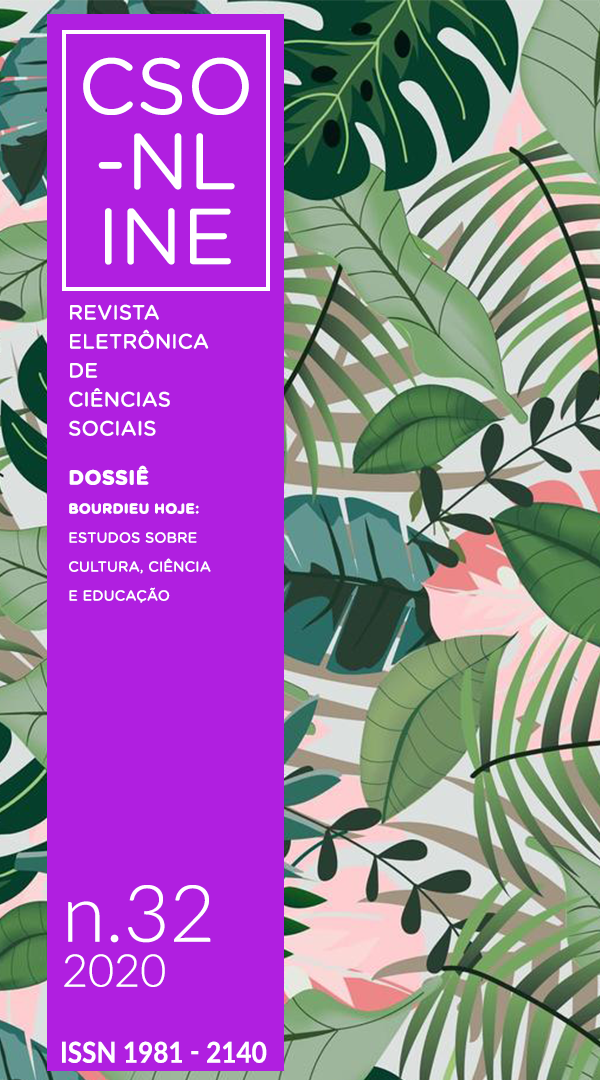What does rock have to do with Bourdieu?
Contributions about the application of the field theory to Portuguese alternative rock (1980-2010)
DOI:
https://doi.org/10.34019/1981-2140.2020.31745Keywords:
produção cultural, rock alternativo, pop rock, campo social, Bourdieu.Abstract
The main goal of this article is to analyse the social representations of alternative rock in Portugal from 1980 to 2010. This is part of broader research into the 30 years of modernization of the country (from the post-revolutionary period initiated in 1974), in which alternative rock is regarded as a significant social practice within the scope of the social, artistic and musical structuring of the country itself. We consider that alternative rock is a subject that is illuminated by Bourdieu’s theory of fields, and we use it to explore the complexity of the relationships that substantiate the underlying structures (of bands, musicians, agents, venues, record labels and promoters) of Portuguese alternative rock. The data we used is the result of a long-term research project carried out between 2005 and 2010, in which in-depth interviews were conducted with more than 200 participants involved in the production and publication spheres of the Portuguese alternative rock segment.
Downloads
References
BOURDIEU, Pierre (1989) - O poder simbólico. Lisboa: Difel.
BOURDIEU, Pierre (1996) - As regras da arte. Lisboa: Editorial Presença.
BOURDIEU, Pierre (2004) - Questões de sociologia. Lisboa: Fim de Século.
BOURDIEU, Pierre; WACQUANT, Löic (1992) – Réponses. Paris: Editions du Seuil.
FOWLER, Bridget (1997) - Pierre Bourdieu and cultural theory – critical investigations. Londres: Sage Publications.
XXX (2010).
XXX (2013).
XXX (2016).
HIBBETT, Ryan (2005) - What Is Indie Rock?. Popular Music and Society. Volume 28. N.º 1. 55–77.
MARTIN, Peter J. (1995) - Sounds and society: themes in the sociology of music. Manchester: Manchester University Press.
MENGER, Pierre-Michel (2002) - Le Paradoxe du musicien. Le Compositeur, le melomane et l'Etat dans la société contemporaine. Paris: HARMATTAN.
REGEV, Motti (1994) - Producing artistic value: the case of rock music. The Sociological Quarterly [em linha]. Volume 35. N.º 1. Disponível em: http://www.jstor.org/stable/4121245. [Consult. 07 de jul. 2020].
REGEV, Motti (2007) - Ethno-national Pop-rock Music: Aesthetic Cosmopolitanism Made from Within. Cultural Sociology. Volume 1. N.º 3. 317–41.
STANKOVIC, Peter (2001) - Appropriating “Balkan”: Rock and Nationalism in Slovenia. Critical Sociology. Volume 27. N.º 3. 98–115.
SZEMERE, Anna (2001) - Up from the Underground: The Culture of Rock Music in Postsocialist Hungary. University Park, PA: Pennsylvania State University Press.
Downloads
Published
How to Cite
Issue
Section
License
Copyright (c) 2020 CSOnline - REVISTA ELETRÔNICA DE CIÊNCIAS SOCIAIS

This work is licensed under a Creative Commons Attribution 4.0 International License.
Todos os artigos científicos publicados na CSOnline – Revista Eletrônica de Ciências Sociais estão licenciados sob uma Licença Creative Commons







